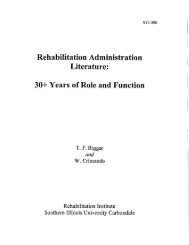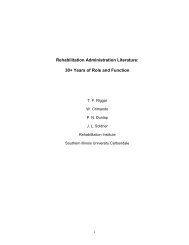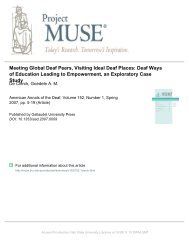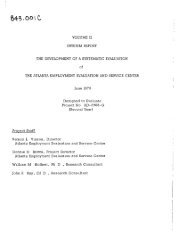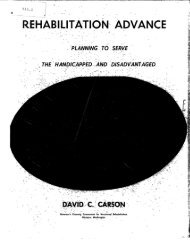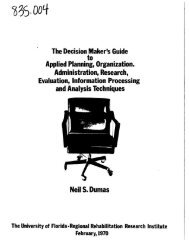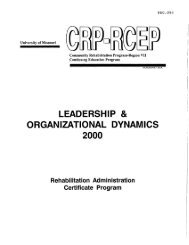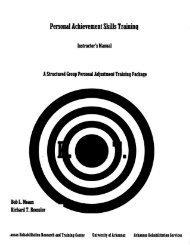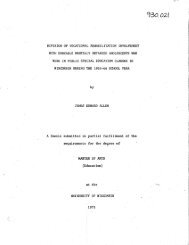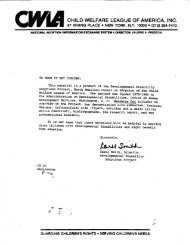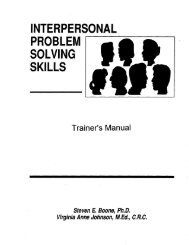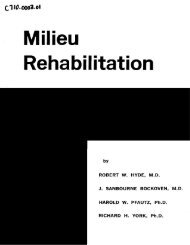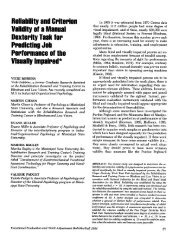Feature Issue on Faith Communities and Persons with ... - NCRTM
Feature Issue on Faith Communities and Persons with ... - NCRTM
Feature Issue on Faith Communities and Persons with ... - NCRTM
You also want an ePaper? Increase the reach of your titles
YUMPU automatically turns print PDFs into web optimized ePapers that Google loves.
Profile<br />
31<br />
administrati<strong>on</strong> communicated <strong>with</strong> <strong>on</strong>e<br />
another <strong>and</strong> trusted <strong>on</strong>e another. We<br />
could have achieved very little, if anything,<br />
if senior management was not a<br />
well-functi<strong>on</strong>ing team who listened to<br />
each other, <strong>and</strong> respected <strong>and</strong> supported<br />
each other. One of the significant features<br />
of this transformati<strong>on</strong> was that it<br />
was accomplished by a relatively small<br />
group of people.<br />
Nowhere was the power of this small<br />
group more apparent than in the area of<br />
staff training. The first area that we<br />
looked at was staff orientati<strong>on</strong>, where<br />
staff were first introduced to the 3I’s&P<br />
<strong>and</strong> the c<strong>on</strong>cept of normalizati<strong>on</strong>; c<strong>on</strong>sequently,<br />
training materials were rewritten<br />
<strong>and</strong> trainers instructed to use<br />
participati<strong>on</strong> in worshipping communities<br />
as an excellent example of inclusi<strong>on</strong><br />
<strong>and</strong> individualizati<strong>on</strong>. Similarly, self-advocacy<br />
training for individuals <strong>with</strong> disabilities<br />
<strong>and</strong> staff focused <strong>on</strong> the right to<br />
worship, <strong>and</strong> our internal auditors were<br />
If we are genuinely working for<br />
an optimal lifestyle for people<br />
<strong>with</strong> disabilities, then we should<br />
be doing everything we can to<br />
facilitate their inclusi<strong>on</strong> in<br />
worshipping communities.<br />
instructed to inquire specifically of staff<br />
<strong>and</strong> those we serve about how this right<br />
was being protected. Residence managers<br />
were briefed at meetings, not <strong>on</strong>ly <strong>on</strong><br />
the need to offer the opti<strong>on</strong> of attending<br />
worship, but also <strong>on</strong> ensuring that staff<br />
<strong>and</strong> transportati<strong>on</strong> were available where<br />
required. The effect of this focused<br />
training was rapidly apparent: New staff<br />
arriving at their first assignment began<br />
asking why those they were serving were<br />
not going to church or synagogue. New<br />
managers just presumed it was normal<br />
to take people to worship <strong>and</strong> did so. Experienced<br />
staff who had wanted to take<br />
individuals to worship in the past, but<br />
did not feel that was permissible, now<br />
felt able to assert themselves. And, individuals<br />
<strong>with</strong> disabilities, returning from<br />
worship, began telling others about their<br />
experiences, sometimes even playing<br />
tapes <strong>and</strong> teaching them hymns. Within<br />
m<strong>on</strong>ths, the number of individuals we<br />
serve who were participating in worship<br />
rose dramatically.<br />
However, <strong>on</strong>e of the difficulties of<br />
this initial success was translating it into<br />
more or less permanent structures. How<br />
could we sustain this phenomen<strong>on</strong><br />
when management changed, staff were<br />
transferred or moved <strong>on</strong> to other jobs,<br />
or service recipients moved <strong>on</strong> to less restrictive<br />
envir<strong>on</strong>ments? A number of<br />
tasks recommended themselves:<br />
• It is a simple assignment to establish,<br />
in the admissi<strong>on</strong> package, not <strong>on</strong>ly<br />
what an individual’s religi<strong>on</strong> is, but<br />
also their current pattern of worship.<br />
We found that prior to their admissi<strong>on</strong>,<br />
a number of people were accustomed<br />
to weekly, even daily, services<br />
of some kind, <strong>and</strong> no c<strong>on</strong>tinuity had<br />
been established. This not <strong>on</strong>ly deprived<br />
them of their customary spiritual<br />
supports, but also the support of<br />
the communities in which they had<br />
participated.<br />
• An agency’s policies <strong>and</strong> procedures<br />
can be rewritten to acknowledge the<br />
importance of each pers<strong>on</strong>’s spiritual<br />
life <strong>and</strong> to provide c<strong>on</strong>tinuity in each<br />
individual’s pattern of religious worship,<br />
c<strong>on</strong>sistent <strong>with</strong> their right to<br />
choose. Further, the policies can remind<br />
staff of each individual’s human<br />
<strong>and</strong> civil rights to worship in the<br />
religi<strong>on</strong> of their choice.<br />
• An agency’s database can be developed<br />
to identify those individuals<br />
who are particularly vulnerable to being<br />
excluded from worship opportunities,<br />
a sort of spiritual risk assessment<br />
tool. Our experience revealed<br />
that those least likely to participate in<br />
worship communities were those<br />
<strong>with</strong> infrequent family c<strong>on</strong>tact, limited<br />
ability to communicate <strong>and</strong> to<br />
ambulate, <strong>and</strong> greater support needs.<br />
The resp<strong>on</strong>se from clergy <strong>and</strong> c<strong>on</strong>gregati<strong>on</strong>s<br />
has ranged from unremarkable<br />
to excellent. Prior planning <strong>and</strong> discussi<strong>on</strong><br />
has eliminated some problems<br />
<strong>with</strong> wheelchair accessibility, special arrangements,<br />
<strong>and</strong> participati<strong>on</strong>. However,<br />
<strong>on</strong>e dimensi<strong>on</strong> of this initiative remains<br />
problematic: How much of a<br />
church’s or synagogue’s instructi<strong>on</strong> <strong>and</strong><br />
worship are truly accessible to pers<strong>on</strong>s<br />
<strong>with</strong> intellectual disabilities? Mary<br />
Therese Harringt<strong>on</strong>, in A Place for All:<br />
Mental Retardati<strong>on</strong>, Catechesis & Liturgy,<br />
comments “Catechesis [religious instructi<strong>on</strong>]<br />
<strong>with</strong>out liturgy [worship] is<br />
dry <strong>and</strong> suffocating. Liturgy <strong>with</strong>out<br />
catechesis is asked to carry more than it<br />
can bear.” Agencies can strive to deliver<br />
people to the door of the church or<br />
synagogue, but they cannot form <strong>and</strong><br />
educate people in their faith; they cannot<br />
design developmentally appropriate<br />
services; they cannot ensure that<br />
people’s experiences are reflected up<strong>on</strong><br />
<strong>and</strong> then c<strong>on</strong>nected to the less<strong>on</strong>s of<br />
Scripture, the cycle of the seas<strong>on</strong>s, the<br />
lives of holy men <strong>and</strong> women, <strong>and</strong> the<br />
dynamics of the liturgy. It is precisely in<br />
this problematic area that worship<br />
emerges as a community resp<strong>on</strong>sibility<br />
in which every<strong>on</strong>e has to play their part.<br />
Agencies have to learn to value <strong>and</strong> promote<br />
the spiritual well-being of individuals<br />
who use their services, they have<br />
to pursue inclusi<strong>on</strong> <strong>and</strong> individualizati<strong>on</strong>,<br />
<strong>and</strong> facilitate genuine relati<strong>on</strong>ships<br />
between people <strong>with</strong> disabilities <strong>and</strong> the<br />
broader community. However, there<br />
must also be people <strong>and</strong> places to welcome<br />
the vulnerable when they arrive, to<br />
greet them <strong>with</strong> respect <strong>and</strong> lead them<br />
by the h<strong>and</strong> to a place of h<strong>on</strong>or, <strong>and</strong> to<br />
genuinely minister to their needs.<br />
Terry Glees<strong>on</strong> is Quality Assurance<br />
Director for PSCH, Inc., College Point, New<br />
York. He may be reached at 718/445-4700<br />
x2070, or at tpglees<strong>on</strong>@hotmail.com.<br />
Published <strong>on</strong> the Web site of the Institute <strong>on</strong> Community Integrati<strong>on</strong> (http://ici.umn.edu/products/impact/143/).



